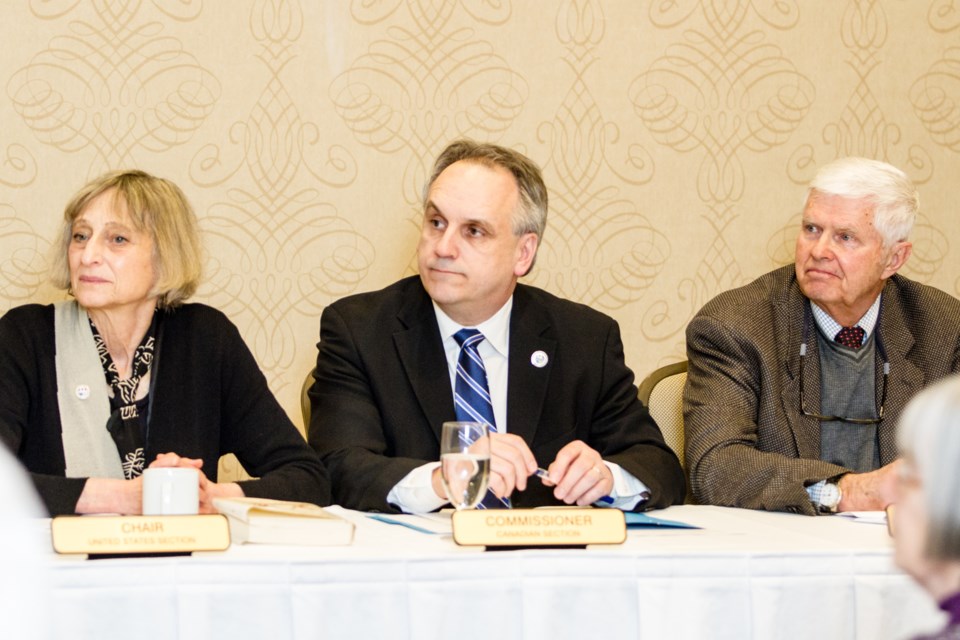During a consultation meeting hosted by the International Joint Commission (IJC) at the Delta Hotel late last week, representatives listened to public comments, concerns and suggestions relating to its Great Lakes Water Quality draft assessment report.
Following locally relevant presentations from Catherine Taddo, land development and environmental engineer, City of Sault Ste. Marie; Michael Ripley, environmental coordinator, Chippewa Ottawa Resource Authority; and Joanie McGuffin of the Lake Superior Watershed Conservancy, the floor was opened to public comments.
Patrick Egan, member of the Steering Committee of the Oil and Water Don’t Mix Coalition of Groups, voiced his organization’s concerns regarding Enbridge Inc.’s Pipeline 5 – two pipelines, 20 inches in diameter, that run under the water through the Straits of Mackinac transporting oil from the lakehead to Sarnia.
Enbridge wants to increase the flow of oil through the aging pipeline, which was built in 1953.
“They have begun physical work on this, including a new pumping station on the south side of the Straits,” Egan told SooToday.
Although Pipeline 5 has transported crude oil without incident for more than 60 years, Oil and Water Don’t Mix find a number of factors troubling:
• A recent increase in the volume and pressure of fluids moving through the pipelines
• The safety record of Enbridge, Inc.
• Newly discovered issues of compliance with the contract between the pipeline company and the State of Michigan
• The age, location, and condition of the pipeline
• Transparency about safety inspections and what petroleum products are being transported through Line 5 in the Great Lakes
• The regulatory environment in Michigan and at the federal level
“Our stand is it should be decommissioned. Instead of trying to prove that it is safe while the oil is flowing, the oil should be stopped,” Egan said.
“The Michigan Attorney General – who is a Republican – has already said this pipeline would never be allowed these days to cross the kind of water that it is crossing. We are advocating that it shut down. If they want to put oil through the Great Lakes, they have to prove they can do it (safely).”
The State of Michigan has the power to shut down Pipeline 5 at any time, Egan said, but his organization is not holding its breath.
Unfortunately, the only economically viable way to transport that volume of oil is pipelines, Egan said.
Other public comments made during the consultation meeting – including those regarding mining practices, toxic materials, and the lack of potable water in many First Nation communities – were all carefully considered by IJC Chair Lana Pollack, U.S. Commissioner Rich Moy, and Canadian Commissioner Richard Morgan.
“I’m taking away a lot of very good comments – a lot of concerns from First Nations about looking into the future, understanding the value of protecting Mother Earth and what we’re doing to Mother Earth,” said Commissioner Moy. “We’re only one species that has to live on this planet, and we need to be very careful what we do.”
Formed in 1909, the IJC operates under the guidelines of the Boundary Waters Treaty, regulating shared water uses, and recommending solutions to transboundary issues, concerns and disputes.
Moy doesn’t feel the IJC or the agreement between Canada and the United States are at risk, even with the current U.S. federal administration’s funding cuts and apparent lack of environmental concern.
“I think the International Joint Commission and the Boundary Waters Treaty between our two governments is looked upon all over the world as the way to resolve transboundary disputes,” he said. “We share the largest boundary in the world. Through our process of collaboration building using science, we have been extremely successful at preventing problems from building up and becoming significant. It’s a win-win situation with very little cost from the governments. I think the IJC and the Boundary Waters Treaty will survive.”
Last week’s consultation meeting in Sault Ste. Marie was the first of a series to be held in a number of Great Lakes communities, including Detroit, Sarnia, Toledo, Buffalo, and St. Catharines.
